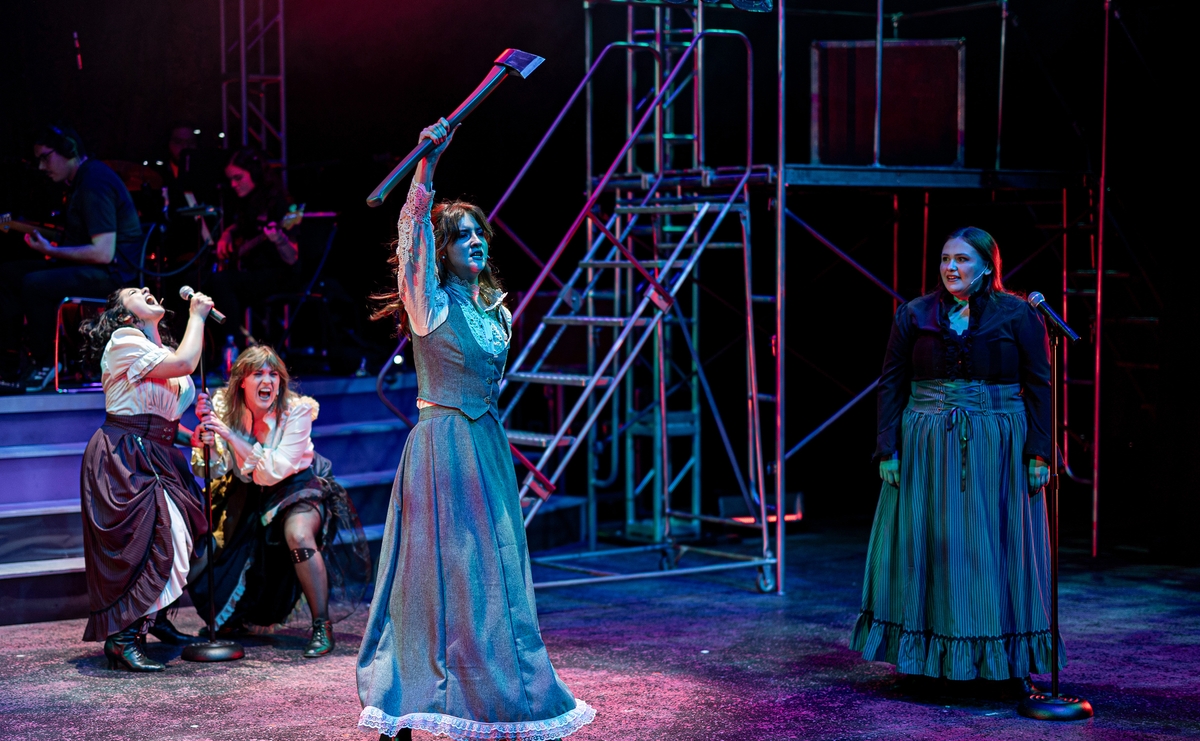Boston
Lizzie Borden’s Story Set To Music — & Mined For New Meaning
by | Oct 25, 2023 1:51 pm
Post a Comment | E-mail the Author
Posted to: Theater

Jim Sabitus Photo
The cast of Lizzie, The Musical, from left: Temma Beaudreau, Liza Giangrande, Sophia Muharram, and Nora Sullivan
Lizzie, The Musical
Umbrella Arts Center
40 Stow St.
Concord, Mass.
Through Nov. 5, 2023
Lizzie Borden took an axe,
And gave her mother forty whacks.
When she saw what she had done,
She gave her father forty-one.
Or at least that’s how the children’s rhyme goes. In reality, Lizzie Borden was acquitted;, it was her stepmother, along with her father, who was killed; a hatchet was used as the murder weapon; and the victims received far fewer than 40 whacks. Nevertheless, the grisly Fall River, Mass. murders have captivated public imagination for over 130 years, with truth often taking a backseat to fiction.
That’s certainly true of Lizzie, The Musical, which is being performed at the Umbrella Arts Center and reimagines the murders and trials as a riot grrrl power rock musical.
In many ways, Lizzie, The Musical is exactly what you think it will be: an irreverent, glorified retelling of the Lizzie Borden story that takes a little too much pleasure in its retelling. Like true crime podcasts or the Salem Witch Trials in October, the play throws a finger to questions of bad taste and reappropriates a possible act of desperation by imbuing it with the assumption of intentionality, liberation, and generally fun badassery.
But instead of campy, the musical is surprisingly earnest. Perhaps the tale of Lizzie Borden lives on because it lies at the intersection of a number of interesting motivations, and the play explores these with a surprising gravity. While the play admits Lizzie’s guilt from the beginning, it sets Lizzie up as a troubled heroine and victim pushing against various motivations for taking control over her own life.
“What kind of life am I living if I have no choice?” Lizzie asks early on, bathed in blue lighting and setting up her redemption arc.
The musical strongly implies sexual abuse from Lizzie’s father, while also introducing a hodgepodge of other motivations for Lizzie’s behavior, including the step-mother’s scheme to secure the daughters’ inheritance, Lizzie’s aspirations to move up the social ladder, a lesbian subplot, and the general societal oppression of the time.
Thrown on top of this is a muddled mix of other motivations, including those from other characters, which may be confusing to follow if you’re not already familiar with the story. Overall, the conveyance of the emotional states of the characters was “tell, not show,” possibly due to the musical’s nature as a rock opera with minimal spoken dialogue, leaving little room for emotional development.

Jim Sabitus Photo
Nora Sullivan, Sophia Muharram, Liza Giangrande, and Temma Beaudreau perform Lizzie, The Musical
With that said, the performance itself, directed by Ilyse Robbins, brought the story to life. The set was appropriately metal (literally) with sparse scaffolding shaping a house. Bright blue and purple lighting gave the scene an edgy tone, and gothic fonts with the word “Lizzie” adorned trunks. A six-person band sat on stage. Two frames above the stage cleverly incorporated historical newspaper clippings and photographs of the characters, and were often used as stand-ins for the presence of the parents.
The all-female, four-person cast gave excellent performances, with vocals which were powerful and occasionally cut short by screams. Their tight harmonies, impassioned power rock, and energetic performance, were truly the star of the show, and the soundtrack was much catchier than I had imagined it being.
Lizzie Borden, played by Sophia Muharram, delivers monster vocals, which seem outsized for the unassuming woman standing onstage. She’s joined by Alice Russell, Lizzie’s best friend, played by Temma Beaudreau, Bridget Sullivan, or “Maggie,” the housemaid, played by Nora Sullivan, and Emma Borden, Lizzie’s sister, played by Liza Giangrande, who gave a truly manic and unhinged performance, lending the play the comic relief I had hoped for. (Her rendition of “What the Fuck, Now, Lizzie?” was my breakaway favorite of the show). Their tight vocalizations, dances, and general presence leant the show its passion and fun.
Despite my reluctance to be swept along with the moral of the story (which seems to go no further than if you can get away with murdering your parents it’s all good), I found myself caught off guard by the sheer power, raw emotion, and empoweredness of some of the scenes. As the play progresses, the women shed their old-fashioned, conservative outfits, ultimately ending up in corsets and fishnets that compliment their newfound confidence and agency, and it’s hard not to get caught up in their excitement. During “Burn the Old Thing Up,” the four women gather in a chilling display of female solidarity to burn Lizzie’s blood-soaked dress, and their hair-raising vocals, accompanied by truly beautiful choreography, left my heart soaring.
While Lizzie was ultimately acquitted, her case lives on. Certainly, the show struck a chord with audience members, who often screamed and cheered, themselves set free from the formality of typical theater performances with this deliciously bad, outstandingly performed, and unconventional musical.